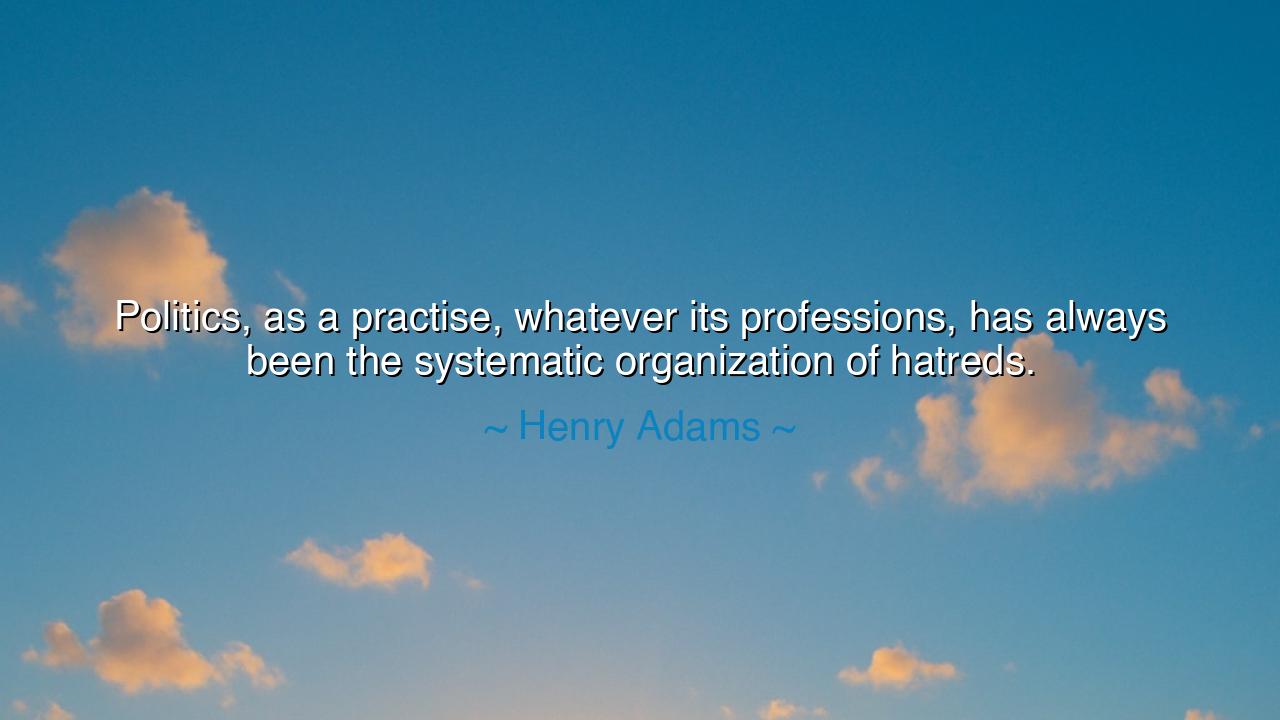
Politics, as a practise, whatever its professions, has always
Politics, as a practise, whatever its professions, has always been the systematic organization of hatreds.






Hear, O children of the future, the grave words of Henry Adams: “Politics, as a practise, whatever its professions, has always been the systematic organization of hatreds.” Mark well these words, for they strip the veil from the councils of power and reveal the ancient machinery beneath. Men may speak of justice, of freedom, of prosperity, but in the contest of nations and factions, the fuel that drives them is too often not love but enmity.
For politics, though it clothes itself in noble raiment, is often a stage upon which hatred is sharpened, ordered, and weaponized. It is no wild passion, chaotic and uncontrolled; it is systematic, arranged with precision, harnessed like fire in the forge. Leaders summon old grievances, kindle tribal memories, and bind the anger of the people into spears aimed at their rivals. Thus, Adams did not invent this truth, but merely gave voice to what the centuries had long revealed.
Remember the tale of Rome in its final days of Republic. The orator Cicero sought to defend the state with words of reason, but men like Clodius and Antony turned the hearts of citizens through scorn and hatred. Faction clashed with faction, Senate with people, until the Republic, choked by its own bitterness, gave way to the empire of Caesars. This is the meaning of Adams’ wisdom: that hatred, once organized, builds its own dominion and leaves little room for concord.
Nor is this truth confined to antiquity. In the age of revolutions, France was torn by the fervor of its own children. Robespierre and the Jacobins spoke of liberty, yet their power was sustained by lists of enemies, by the systematic organization of hatreds against aristocrats, priests, and even fellow revolutionaries. In their zeal, they proved Adams correct: politics, even when clothed in idealism, thrives upon dividing neighbor from neighbor.
Yet let this not bring despair. For to recognize the danger is the first step toward wisdom. If men can be taught to channel hatred into destruction, then they can also be taught to dissolve it into compassion. The true statesman is not he who organizes hatreds most efficiently, but he who transforms them, who teaches his people that their rival is but a mirror of themselves. Adams spoke with the sternness of a prophet; it is for us, the inheritors of his words, to strive for a politics that organizes not hatred, but hope.






KNNguyen Thi Kim Nhu
Henry Adams' perspective is sobering. Politics often seems to revolve around creating and maintaining divisions. The way certain issues are framed—immigration, healthcare, the economy—often pits groups against one another. But is this something inherent in politics itself, or is it a symptom of the times? Could the system be restructured to focus more on finding common ground instead of amplifying conflict? What would a politics of unity look like?
NALe Nhat Anh
This quote speaks to the dark side of politics. It's almost as if the focus on conflict and 'us versus them' has overshadowed the possibility of genuine cooperation. But can we blame politics entirely for this? Aren't politicians just reflecting the societal divisions that already exist? It raises the question: are we as citizens also responsible for feeding into these divisions? Could there be a better way to engage politically without resorting to hate?
HDH. Dat
I get why Henry Adams might say this, given how polarized politics has become. But is it fair to say that all politics revolves around hatred? Politics can also bring people together to address common issues, like public health or climate change. While it's true that hatred and division are often exploited, is it possible to create a system that focuses on constructive dialogue and collaboration instead of conflict?
TMTan Minh
This quote strikes me as a bit bleak, but is it really far from the truth? Politics often seems to highlight differences, whether they be political, economic, or social, which inevitably stirs hatred. The question is, can we have a healthy political environment that focuses on unity rather than division? Or is this system of organizing hatreds simply how politics will always function? It would be interesting to explore alternatives.
QDtran quoc dat
Henry Adams' statement is pretty harsh, but I think there's some truth to it. Politics seems to often exploit existing social tensions. Is it really about representing the people, or is it about wielding power through creating conflict? It’s concerning to think that our political systems are built on such a foundation. But can politics ever escape this cycle of division, or is it an inherent part of the system?